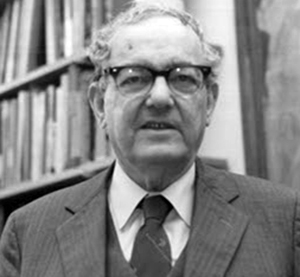
Herbert Alexander Simon (June 15, 1916 - February 9, 2001), a Nobel laureate, was an American political scientist, economist, sociologist, psychologist, computer scientist, and Richard King Mellon Professor- most notably at Carnegie Mellon University- whose research ranged across the fields of cognitive psychology, cognitive science, computer science, public administration, economics, management, philosophy of science, sociology, and political science, unified by studies of decision-making. With almost a thousand highly cited publications, he was one of the most influential social scientists of the twentieth century. (Click here for full Wikipedia article)
-----
Anything that gives us new knowledge gives us an opportunity to be more rational.
Engineering, medicine, business, architecture and painting are concerned not with the necessary but with the contingent- not with how things are but with how they might be- in short, with design.
Everyone designs who devises courses of action aimed at changing existing situations into preferred ones.
Human beings, viewed as behaving systems, are quite simple. The apparent complexity of our behavior over time is largely a reflection of the complexity of the environment in which we find ourselves.
Human knowledge has been changing from the word go and people in certain respects behave more rationally than they did when they didn't have it. They spend less time doing rain dances and more time seeding clouds.
I don't care how big and fast computers are, they're not as big and fast as the world.
If there were no limits to human rationality administrative theory would be barren. It would consist of the single precept: Always select that alternative, among those available, which will lead to the most complete achievement of your goals.
In the computer field, the moment of truth is a running program; all else is prophecy.
Learning is any change in a system that produces a more or less permanent change in its capacity for adapting to its environment.
Maybe we ought to have a world in which things are divided between people kind of fairly.
Most of us really aren't horribly unique. There are 6 billion of us. Put 'em all in one room and very few would stand out as individuals. So maybe we ought to think of worth in terms of our ability to get along as a part of nature, rather than being the lords over nature.
One finds limits by pushing them.
One of the first rules of science is if somebody delivers a secret weapon to you, you better use it.
Technology may create a condition, but the questions are what do we do about ourselves. We better understand ourselves pretty clearly and we better find ways to like ourselves.
The engineer, and more generally the designer, is concerned with how things ought to be- how they ought to be in order to attain goals, and to function.
The proper study of mankind is the science of design.
The social sciences, I thought, needed the same kind of rigor and the same mathematical underpinnings that had made the 'hard' sciences so brilliantly successful.
The techniques of the practitioner are usually called 'synthetic'. He designs by organizing known principles and devices into larger systems.
The world is vast, beautiful, and fascinating, even awe-inspiring- but impersonal. It demands nothing of me, and allows me to demand nothing of it.
The world you perceive is a drastically simplified model of the real world.
There are no morals about technology at all. Technology expands our ways of thinking about things, expands our ways of doing things. If we're bad people we use technology for bad purposes and if we're good people we use it for good purposes.
What information consumes is rather obvious: it consumes the attention of its recipients. Hence a wealth of information creates a poverty of attention, and a need to allocate that attention efficiently among the overabundance of information sources that might consume it.
-----
(June 15 is also the birthday of Mario Cuomo.)
Categories: Herbert Simon, Quotes of the day
Home KGB on Bluesky KGB on Substack
KGB Stuff Commentwear E-Mail KGB
Donate via PayPal

















